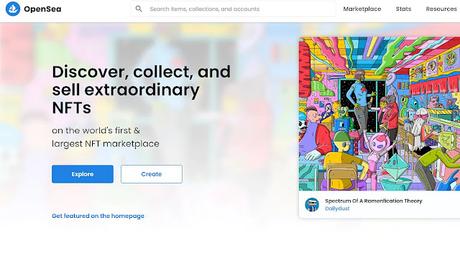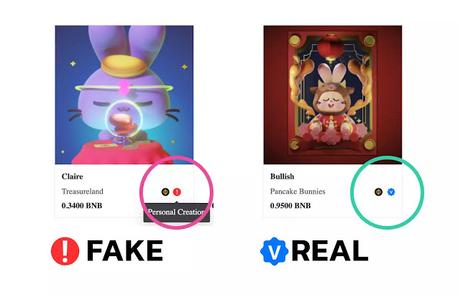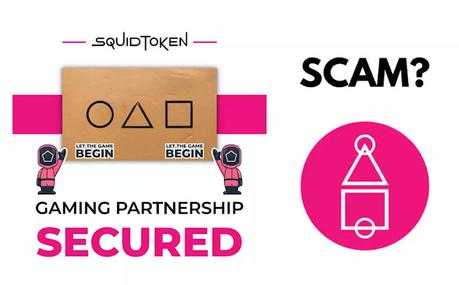
pic credit: Reason Magzine
We've all seen the NFT boom this year, with even the world's major news sites covering it! All of the excitement around digital art, memes, generative art, and other collectibles based on the blockchain drew not just artists and investors, but also scammers.
It is more crucial than ever to protect yourself and keep as far away from any potential risk as possible; this is why I chose to write this post to explain to you how to spot scammers while also providing some safety recommendations.
Are NFTs Scam?
Before we begin, I'd want to state unequivocally that, contrary to what many individuals have said on social media, on blog postings, and even on massive trucks, NFTs are NOT scams! There have been several disputes on this subject, and I'd simply want to point out that many artists and creators, including myself, are minting and selling legitimate works of art and collectibles as NFTs.
In the field, there are also a number of developers working on new protocols, marketplaces, and technological advancements. To imply that all of these folks are con artists and that the technology they've been developing is rubbish is untrue and unkind, to say the least.
So are NFTs scams? NO! The right question should be: are there scams in NFTs? And the answer to this question is a resounding YES! Now that we got this outta the way, let’s get into the main topic of this article which is identifying the most common scams.
Scam #1 fake websites and storefronts

pic credit: Google Images|NDTV gadgets
Fake websites and storefronts are the first and most popular scams. When searching for places to buy NFTs on Google, you could come across a few bogus NFT trending websites. It's often difficult to tell the difference since they seem EXACTLY like the genuine website, with the exception of a little spelling error on the domain name that we miss.
There are two major issues to be concerned about here:
1. You will almost certainly receive a false and worthless NFT if you make a purchase on one of these fake websites. You'd essentially be wasting your money.
2. Scammers have access to all of the credentials you provide on the websites. They may ask for your Ethereum wallet's seed phrase (which is your crypto wallet's master key) and use it to break into your wallet and take all of your coins.
So how can you be sure that you are actually navigating on a legit NFT marketplace website, and that these things are not gonna happen to you?
First and foremost, double-check the webpage you're viewing for any spelling mistakes. Second, if it's an unknown NFT marketplace that you've never heard of, do some research and due diligence to ensure that the storefront is legitimate and trustworthy.
Finally, take in mind that fake NFT businesses will accept purchasers who have not been confirmed. Larger vendors will get a blue verification check next to their usernames on official stores, similar to what you'd see on Instagram or Twitter.
It's also crucial to conduct an extensive study on the NFT project you're considering. NFTs that normally sell for hundreds of thousands of dollars will be shown for a fraction of their true value on several scam sites. Keep taking warned that phony social media profiles impersonating significant NFT marketplaces exist. Before you do anything more, be sure that the account is authenticated.
Scam #2 Fake offers

pic credit: Twitter App
The second and very common scam is fake offers, which usually come to your email. The scammer sends a fake email claiming that someone has made an offer for your NFT and they ask you to click on an embedded button.
That button leads to a fake or phishing website where you’d most likely be asked to connect your wallet and submit your seed phrase. With this information in hand, the scammer can hack into your wallet and steal everything.
To make sure you won’t be a victim of this kind of scam, you can simply check the email address that’s sending you this offer alert. If you still can’t tell if that’s fake or not, don’t click on the button and log into your account directly on the Marketplace’s website. If the offer is legit, it will be showing there.
Scam #3 Technical support impersonation

pic credit: Google Images
Technical support impersonation is the third most popular fraud. This is very prevalent on Discord, so be cautious and don't believe every DM you receive!
When you have a technical issue with a platform, you generally have two options: send an email to customer care or post on the site's discord server (usually, they have a dedicated channel for that). A fraudster imitating customer support will DM you as soon as you submit a message, especially on Discord.
This has truly happened to me! I contacted OpenSea via Discord, and as soon as I pushed enter and submitted the message, two fraudulent identities posing as OpenSea's support contacted me. In my case, I simply ignored the messages and blocked their accounts, but what usually happens when someone responds is: they ask you to share your screen to check what’s going on, making you reveal your crypto wallet’s credentials, or they redirect you to a website that looks like the official website and convince you to enter personal information there and…well, you may already know what will happen next.
Don’t fall for it! I always prefer to send an email directly to customer support to avoid these kinds of situations, and when receiving the reply, to verify the email address. And never EVER send your seed phrase or private keys to anyone - EVER
Scam #4 Fake NFT projects

pic credit: Egorithms
Fake NFT projects are the fourth most popular fraud (the famous rug pulls). Unfortunately, there are ponzi scams and rug-pulls in the NFT business, therefore it's important to educate oneself about the hazards of investing.
The Squid NFT project - a token collection inspired by the world-famous Netflix series Squid Game - was one of the most significant cases that occurred recently. Owners were unable to sell their tokens when the price hit its high. The creators sold their tokens and departed, sending the price of the tokens falling to near-zero.
The only people who profit from such scams are the NFT creators. The Squid NFT project case is just one of many examples of rug-pulls and fake projects. It’s really sad, but this happens way too often. Most of the time, they don’t make the headlines, but it’s extremely important to be aware of the risks involved.
Here are a few pointers to help you avoid becoming trapped in a phony project:
1. Check to see who is funding this NFT initiative. Are these folks dependable? How long have they been a part of the NFT scene? What is their track record?
2. Make sure you're familiar with the project's crew or the artist behind a certain piece of artwork. Have they completed any additional NFT projects or artwork? What are the opinions of prior buyers of these NFTs?
3. If the NFT price has dropped and you want to acquire it on the secondary market, make sure the project and smart contract are both confirmed. Some Marketplaces (like OpenSea) provide verification badges that may be used to check and verify this.
Scam #5 Fake giveaways

pic credit:Bolster.ai
Finally, fake giveaways are the fifth most popular fraud. In this fraud, you'll receive a message from a fake account, generally on Twitter, Instagram, or Discord, informing you that you've won an NFT.
This fake account will then send you a link to a fake NFT website, where you will be asked to connect your cryptocurrency wallet and input their seed phrase.
The basic rule is that if an offer appears to be too good to be true, it most often is. Ignore such messages and get on with your life. Don't fall for that; no one will offer you precious NFTs at random.
Extra safety tips
Aside from the suggestions made in this post, there are a few additional things you can do to guarantee that you are taking almost no risks:
1. Protect your wallet credentials by never disclosing your seed phrase (or recovery phrase)
2. To avoid phishing, use authentic wallet applications and browser extensions.
3. Protect your accounts by using strong passwords and enabling two-factor authentication (2FA).
4. Check the contract address on the NFT website. It should state the location of the NFT's minted. You can verify the accuracy of the information by visiting the creator's website.
Final thoughts
I know it's a little frightening to consider how many various frauds are out there these days. Unfortunately, NFTs have drawn the attention of numerous cybercriminals, who are growing increasingly inventive in coming up with new ways to deceive consumers every other week.
All I can say is that if you stay cautious, use all of the recommendations I gave you, and continue to conduct your own research, you'll most likely stay aware of scammers and know how to spot them.
You'll be safe when venturing into the amazing and incredibly promising world of NFTs if you do it this way. So now I'm curious: have you ever been a victim of an NFT scam? Do you know anyone who has fallen victim to any of them? Let me know in the comment section below.

